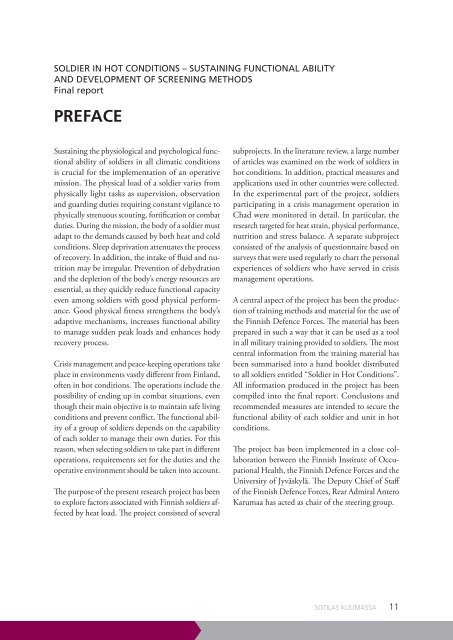Sotilas+kuumassa+loppuraportti
Sotilas+kuumassa+loppuraportti
Sotilas+kuumassa+loppuraportti
You also want an ePaper? Increase the reach of your titles
YUMPU automatically turns print PDFs into web optimized ePapers that Google loves.
SOLDIER IN HOT CONDITIONS – SUSTAINING FUNCTIONAL ABILITY<br />
AND DEVELOPMENT OF SCREENING METHODS<br />
Final report<br />
PREFACE<br />
Sustaining the physiological and psychological functional<br />
ability of soldiers in all climatic conditions<br />
is crucial for the implementation of an operative<br />
mission. The physical load of a soldier varies from<br />
physically light tasks as supervision, observation<br />
and guarding duties requiring constant vigilance to<br />
physically strenuous scouting, fortification or combat<br />
duties. During the mission, the body of a soldier must<br />
adapt to the demands caused by both heat and cold<br />
conditions. Sleep deprivation attenuates the process<br />
of recovery. In addition, the intake of fluid and nutrition<br />
may be irregular. Prevention of dehydration<br />
and the depletion of the body’s energy resources are<br />
essential, as they quickly reduce functional capacity<br />
even among soldiers with good physical performance.<br />
Good physical fitness strengthens the body’s<br />
adaptive mechanisms, increases functional ability<br />
to manage sudden peak loads and enhances body<br />
recovery process.<br />
Crisis management and peace-keeping operations take<br />
place in environments vastly different from Finland,<br />
often in hot conditions. The operations include the<br />
possibility of ending up in combat situations, even<br />
though their main objective is to maintain safe living<br />
conditions and prevent conflict. The functional ability<br />
of a group of soldiers depends on the capability<br />
of each solder to manage their own duties. For this<br />
reason, when selecting soldiers to take part in different<br />
operations, requirements set for the duties and the<br />
operative environment should be taken into account.<br />
The purpose of the present research project has been<br />
to explore factors associated with Finnish soldiers affected<br />
by heat load. The project consisted of several<br />
subprojects. In the literature review, a large number<br />
of articles was examined on the work of soldiers in<br />
hot conditions. In addition, practical measures and<br />
applications used in other countries were collected.<br />
In the experimental part of the project, soldiers<br />
participating in a crisis management operation in<br />
Chad were monitored in detail. In particular, the<br />
research targeted for heat strain, physical performance,<br />
nutrition and stress balance. A separate subproject<br />
consisted of the analysis of questionnaire based on<br />
surveys that were used regularly to chart the personal<br />
experiences of soldiers who have served in crisis<br />
management operations.<br />
A central aspect of the project has been the production<br />
of training methods and material for the use of<br />
the Finnish Defence Forces. The material has been<br />
prepared in such a way that it can be used as a tool<br />
in all military training provided to soldiers. The most<br />
central information from the training material has<br />
been summarised into a hand booklet distributed<br />
to all soldiers entitled “Soldier in Hot Conditions”.<br />
All information produced in the project has been<br />
compiled into the final report. Conclusions and<br />
recommended measures are intended to secure the<br />
functional ability of each soldier and unit in hot<br />
conditions.<br />
The project has been implemented in a close collaboration<br />
between the Finnish Institute of Occupational<br />
Health, the Finnish Defence Forces and the<br />
University of Jyväskylä. The Deputy Chief of Staff<br />
of the Finnish Defence Forces, Rear Admiral Antero<br />
Karumaa has acted as chair of the steering group.<br />
SOTILAS KUUMASSA<br />
11


